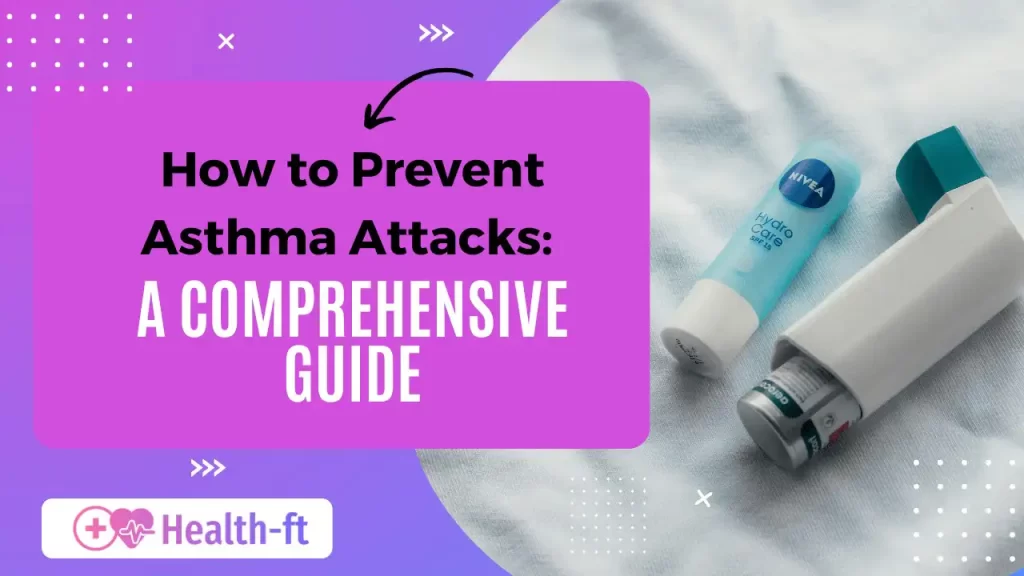Many kinds of chronic diseases develop in the human respiratory system; one of them is asthma, which is widespread in many countries. The truth is that it can be quite a debilitating disease because it may result in the patient having to struggle with breathing problems, chest pains, and coughs. One important thing to realize is that asthma in adults is not an untreatable disease. Learning how to prevent asthma attacks can significantly improve the odds of managing the condition effectively and boosting the well-being of those affected.
What is Asthma?
Asthma is a chronic inflammatory condition that affects the airways, specifically the bronchi, causing them to constrict and swell, which makes breathing difficult. Environmental factors such as allergens, air pollution, cold air, or respiratory illnesses often trigger this condition. Asthma severity varies widely; some individuals may experience occasional attacks once or twice a year, while others suffer from frequent and severe episodes that significantly disrupt daily activities.
How many Types of Asthma are there?
Intermittent Asthma:
Symptoms appear occasionally, often triggered by factors like infections or allergens. It doesn’t significantly disrupt daily activities.
Persistent Asthma:
Symptoms occur regularly, categorized into mild, moderate, and severe, based on their frequency and intensity.
Allergic Asthma:
Triggered by allergens like pollen, mold, pet dander, or dust mites.
Non-allergic Asthma:
Triggered by factors such as exercise, stress, or weather changes.
Exercise-induced Asthma:
Symptoms appear during or after physical activity.
Occupational Asthma:
Caused by exposure to irritants or allergens at work.
Asthma-COPD Overlap Syndrome (ACOS):
A combination of asthma and chronic obstructive pulmonary disease (COPD).
What are the Common Symptoms of Asthma?
Asthma symptoms can vary from person to person, but the most common symptoms include;
Shortness of breath:
Pain that is worse during sports sections and at night.
Chest tightness or pain:
It is a difficult to describe discomfort within the chest that can be quite agonizing.
Wheezing:
Breath sounds, particularly wheezing or shouting whistles such as the are audible or heard during blowing out.
Coughing:
This can be persistent and is often associated with cough variant asthma, prevailing mostly at night or early in the morning.
Trouble sleeping:
Odd sensations in the chest and problems breathing especially at night which results in poor sleep as well as fatigue hence poor quality of life.
How to Prevent Asthma Attacks?
Prevention is key to managing asthma. Below are strategies to reduce the likelihood of asthma attacks:
Identify and Avoid Triggers
Triggers are factors that cause inflammation and swelling in the airways, leading to asthma attacks. Common triggers include:
- Allergens: Pollen, dust mites, mold, pet dander, and other allergens are common culprits.
- Air Pollution: Smoke, fumes, and pollution can aggravate asthma symptoms.
- Respiratory Infections: Conditions like the flu and colds can worsen asthma symptoms.
- Exercise: Physical activity may trigger exercise-induced asthma.
- Weather Conditions: Cold air, humidity, and drastic weather changes can provoke asthma.
- Stress and Strong Emotions: High levels of stress or intense emotions can lead to asthma flare-ups.
Follow an Asthma Action Plan
An Asthma Action Plan is a personalized guideline developed with your doctor. It includes:
- Medications: Information about daily control medications and relievers for attacks.
- Peak Flow Meter Readings: Instructions on how to check lung function.
- Trigger Avoidance: Tips for minimizing exposure to known asthma triggers.
- Emergency Instructions: Steps to take during a severe asthma attack.
Take Medications as Prescribed
Long-term control medications help prevent inflammation in the airways, managing symptoms and reducing the frequency of attacks.
Quick-relief medications (e.g., rescue inhalers) provide immediate relief during asthma attacks by relaxing the airways and making it easier to breathe. Always keep your rescue inhaler nearby.
Maintain a Healthy Lifestyle
- Exercise regularly: While exercise can trigger asthma in some individuals, it can also improve lung function and reduce symptoms. Consult your doctor to develop a suitable exercise plan.
- Eat a balanced diet: A diet rich in fruits, vegetables, and lean proteins can strengthen your immune system and reduce inflammation. Foods high in antioxidants and omega-3 fatty acids, such as fish and nuts, may be particularly beneficial.
- Manage stress: Stress can worsen asthma, so it’s important to practice stress-reduction techniques like deep breathing, yoga, or meditation.
How to Reduce Asthma Symptoms
Reducing asthma symptoms is essential to maintaining a healthy lifestyle. Here are some strategies to help:
Improve Indoor Air Quality
- Use air purifiers: HEPA filters can trap small particles like dust and pollen, improving the air quality in your home.
- Keep your home clean: Regularly clean your home to reduce dust, mold, and allergens. Use a vacuum with a HEPA filter and wash bed linens in hot water.
- Control humidity levels: Maintain 30-50% indoor humidity to prevent mold and dust mites from thriving.
Practice Breathing Exercises
Breathing exercises can help improve lung capacity and reduce asthma symptoms. Two effective techniques are:
- Diaphragmatic Breathing (Belly Breathing): This deep breathing technique helps enhance lung function by using the diaphragm rather than shallow chest breathing.
- Pursed-lip Breathing: This technique involves breathing in through your nose and out through pursed lips, helping to keep airways open longer.
Stay Hydrated
Drinking plenty of water helps hydrate your airways, preventing them from drying and irritating.
Use Natural Remedies
Some natural remedies may help manage asthma symptoms:
- Ginger: Known for its anti-inflammatory properties, ginger can help relax muscles in the airways and improve breathing.
- Honey: Honey has soothing effects on the throat and may help reduce coughing.
- Essential Oils: Eucalyptus and peppermint oils, when used in steam or a diffuser, can help ease breathing.
Ways to Reduce Asthma Attacks
In addition to the prevention strategies outlined above, here are additional steps to reduce asthma attacks:
Avoid Smoke
- Quit smoking: Tobacco smoke is a powerful asthma trigger. Quitting smoking is one of the best things you can do for your respiratory health.
- Avoid secondhand smoke: Stay away from people who are smoking, and ask others not to smoke around you.
Manage Allergies
Managing allergies is a key step in reducing asthma symptoms, as the allergy of asthma often occurs alongside this condition. Consider:
- Taking allergy medications: Consult your doctor about antihistamines or other allergy medications that can reduce asthma flare-ups.
- Considering allergy shots: Allergy immunotherapy can reduce sensitivity to allergens and improve asthma control.
Be Prepared for Exercise
Before exercising, it’s important to:
- Warm-up: A proper warm-up can reduce the likelihood of an asthma attack during physical activity.
Travel with Caution
When traveling, especially to areas with different climates or high altitudes, asthma may worsen. Here are tips for safe travel:
- Pack your medications: Always carry your asthma medications, including a rescue inhaler.
- Research your destination: Check the air quality and pollen levels before traveling.
Conclusion
While asthma is a lifelong condition, it is manageable with the right care. Understanding how to prevent asthma attacks is crucial for reducing the impact of the disease on daily life. By following an asthma action plan, avoiding triggers, taking medications as prescribed, and maintaining a healthy lifestyle, individuals with asthma can better control their symptoms. Regular check-ups with a healthcare provider and open communication are essential to managing asthma effectively.
Asthma management requires dedication, but individuals can lead healthy, fulfilling lives with the right strategies and support.
FAQs
How long do asthma attacks last?
Asthma attacks can last anywhere from a few minutes to several hours or even days, depending on the severity and how quickly treatment is administered. Mild attacks often resolve quickly with medication, while severe ones may require prolonged care and medical attention.




